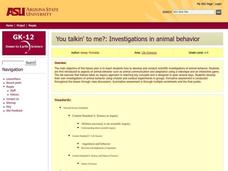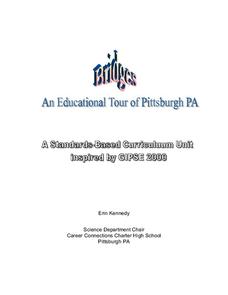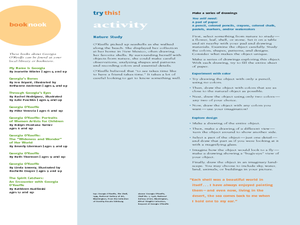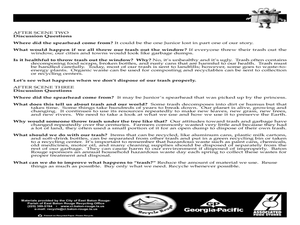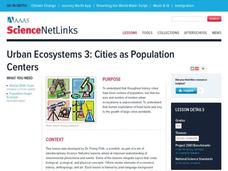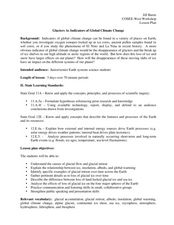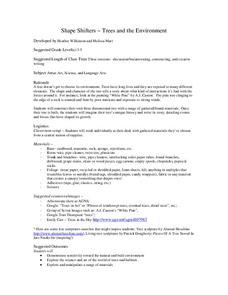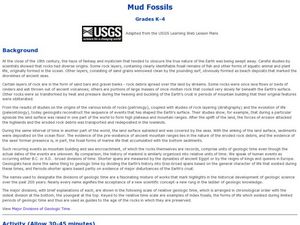Virginia Department of Education
Determining Absolute Age
How can radioactive decay help date old objects? Learners explore half-life and radioactive decay by conducting an experiment using pennies to represent atoms. Young scientists graph data from the experiment to identify radioactive decay...
Curated OER
Building Up, Breaking Down
Students investigate how rocks are modified into construction materials. In this building up and breaking down lesson plan, students explore what happens to building materials over time and how people modify natural materials. Students...
Curated OER
Dig Into Ireland
Students explore environments and wildlife of Ireland to find out how they were formed, and how they helped form Irish culture. Students research online to determine connections between present elements in Irish culture and wildlife and...
Curated OER
You Talkin' To Me?: Investigations in Animal Behavior
Young scholars investigate a variety of animal behaviors, examine various modes of animal communication, and develop a catalog analyzing, interpreting, and reporting their results.
Curated OER
ToxMystery Lesson Plan 2 : Case Book: Catch That Hazard!!!
Students explore toxic hazards. In this personal health activity, students discover appropriate uses for household chemicals as they identify potentially harmful products in their homes.
Curated OER
Bridges
Young scholars are introduced to the different types, designs and nature of bridges. They observe a historical look at the bridges in and around the Pittsburgh area through a video presentation. Connections are made between science and...
Curated OER
The Beautiful Works of Georgia O'Keefe
Students discover the art of Georgia O'Keefe. In this art history instructional activity, students investigate the influential power nature has on art. Students create their own works of art by observing local nature.
Curated OER
Make it a habitat
Students consider the adaptation of life forms through natural selection to fill various niches and accommodate changing environmental conditions. They select an ecosystem and conduct research to provide as much detailed information as...
Curated OER
Fitting Trash into Yesterday: A Fifth Grade Activity
Fifth graders explore the concept of waste management. In this recycling lesson, 5th graders discover the history of waste management and discuss how the U.S. should respond to the issue of ever-increasing waste.
Curated OER
Make a Comet Model and Eat It!
Students construct a comet model based on procedure provided. In this space science instructional activity, students compare the physical properties of comets to the models they made. They record their observations and share them with...
Curated OER
Water Creative Writing
Students red and discuss an example of a biographical essay. They read The Last of the Falling Tide by Car Hiassen, answer factual questions concerning the work, and create their own story about a natural place they are familiar with ,...
Curated OER
Introduction to Friction
Learners study the properties of the frictional force between two surfaces in contact. They inspect various phenomena in nature where friction plays an important role and demonstrate
Curated OER
Understanding Cladistics
Young scholars explore cladistics and create a cladogram of their own. They are shown how the scientist at the American Museum of Natural History use a method called cladistics to group animals. Students are asked how the animals (lion,...
Curated OER
How Grandmother Spider Stole the Sun
Students explore U.S. history by reading a Native American tale in class. In this cultural storytelling instructional activity, students read the story How Grandmother Spider Stole the Sun and discuss the characters and themes of the...
Curated OER
Urban Ecosystems 3: Cities as Population Centers
Young scholars discover that throughout history cities have been centers of population but that human exploitation of fossil fuels was key to the growth of large cities worldwide. They research urban growth through a number of websites.
Curated OER
Paper Making
Young scholars work together to make recycled paper. They identify examples of recycled materials and discover what can and cannot be recycled. They explore the history of paper making as well.
Curated OER
It Comes In Waves
Learners investigate the behavior and different origins of tsunami waves, and they then research and chart the path of certain tsunamis from recent history using the Internet, maps and firsthand accounts.
Curated OER
Glaciers As Indicators of Global Climate Change
Students research about glacial ice melting on the four major spheres of the Earth. In this earth science lesson, students explain how this process relates to global warming. They create a presentation and share their findings with the...
Curated OER
Fires and Fire Suppression
Learners examine their assumptions about forest fires. They explore the conflicts involved with the forest service's new strategy. in addition, they will study one case where a prescribed natural burn had a significant impact on a later,...
Curated OER
Get Ready to Rumble
Students use the Internet to examine earthquakes. They discover the theory of tectonic plates and analyze faults throughout the world. They also examine the science of seismology to explain how earthquakes are measured.
Curated OER
Shape Shifters- Trees and the Environment
Students make a tree sculpture. In this trees and the environment lesson, students learn about the parts of a tree, discuss what a tree needs in order to grow, find images of trees in art and nature, use various materials to create a...
Curated OER
Water
Students learn about the history of Indiana's water and understand how easily pollution can contaminate the water supply. They also learn how little fresh water we have and how important it is to protect it.
Curated OER
Archaeology and Storytelling
Learners identify and interpret both individual families and whole cultures learn about their pasts by collecting and analyzing stories and artifacts. Then they identify that not all archaeological finds readily reveal their history to...
Curated OER
Mud Fossils
Students observe real fossils. In this science lesson, students make their own mud fossils by pressing material into the mud and letting it dry in the sun for 3-4 days. Students then get the fossils out displaying their mud...





